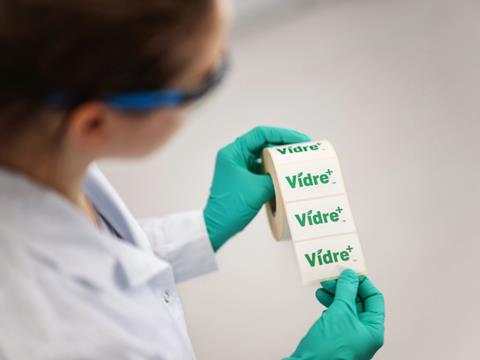
FreshInset claims that a study of its Vidre+ complex revealed it can ‘transform’ clamshell or any other packaging into an active packaging solution, able to preserve the freshness of cherries for longer.
The company says cherries are sensitive to heat and dehydration on shelf with their fragility potentially leading to post-harvest losses, which is a challenge throughout the supply chain. It adds that one of the biggest problems with cherries is how quickly they lose their appeal, visually and nutritionally.
FreshInset states that when the Vidre+ complex was applied for the study, the cherries had the least weight loss, kept better quality and maintained stem colour and firmness for longer compared to the control group. Apparently, the Vidre+ technology uses the 1-MCP substance to slow down the ripening process and protect quality.
According to FreshInset, the gradual release of 1-MCP happens inside the packaging post-harvest: farmers or packers could place the Vidre+ complex inside the clamshell or other packaging and within 24 hours the fruits, vegetables and even flowers begin to benefit.
The study was conducted in summer 2022 by professor Dorota Wichrowska and a team from the University of Life Sciences in Bydgoszcz, Poland, exploring how Vidre+ affects the Kordia and Regina cherry varieties. The cherries were observed for changes in appearance, firmness, nutrient levels, and chemical composition over 21 days.
The main results of the study included untreated cherries beginning to lose quality after 3 days compared to those with Vidre+ protection, which began to degrade after 9 days. The treated fruit was also said to retain ‘noticeably better’ firmness, especially from day 6 onward.
We recently spoke to Fresh Inset and Avery Dennison about Vidre+ as their finalist entry for this year’s Sustainability Awards, designed to extend fruit and vegetable freshness. The solution features adjustable dosage per crop variety and pack size, hoping to transform a traditional packaging label into a ‘smart, active component’ of the supply chain.
Earlier this year, researchers from Chalmers University of Technology announced they had packaged canned tuna infused in the water-based solution of amino acid cysteine, said to remove up to 35% of the accumulated mercury. The active packaging solutions seeks address concerns over the accumulation of toxic mercury, citing the World Health Organisation (WHO)’s warnings that mercury is one of the ten most harmful chemicals for humans.
If you liked this story, you might also enjoy:
The ultimate guide to the Packaging and Packaging Waste Regulation in 2025
How are the top brands progressing on packaging sustainability?
Everything you need to know about global packaging sustainability regulation in 2025
The key to increasing the use of reusable packaging in supermarkets














No comments yet